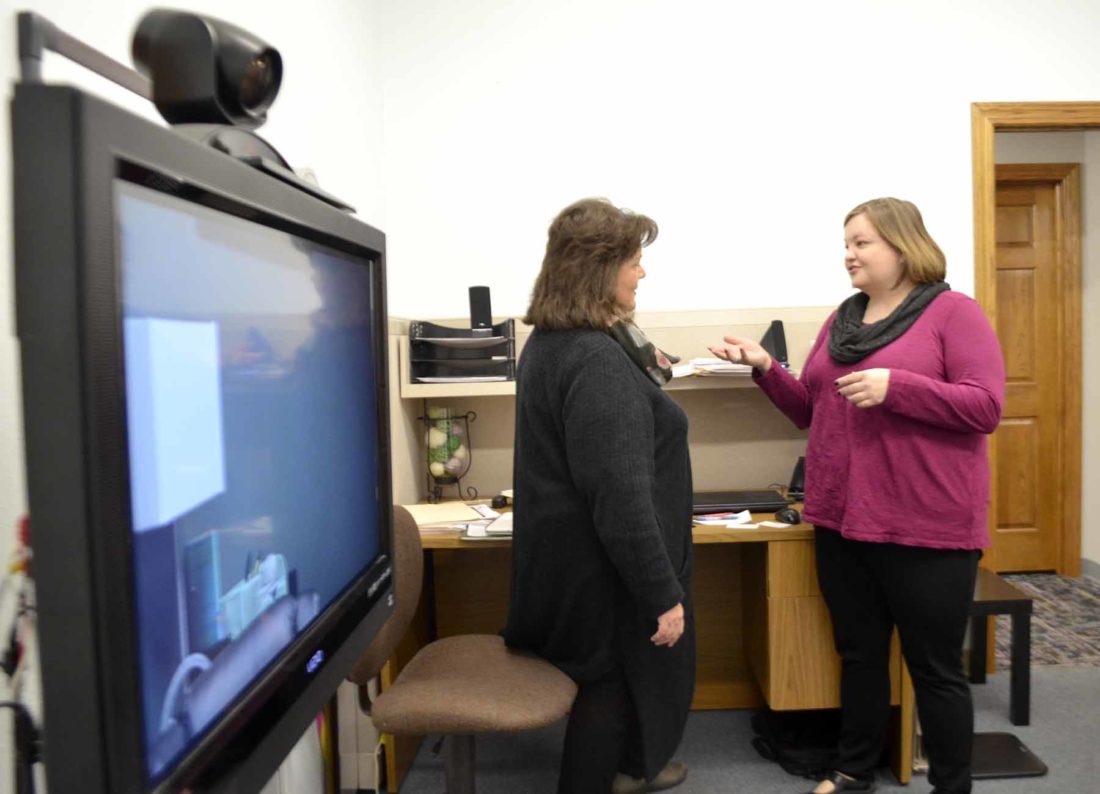Making mental health easier
CFI benefits from Telligen grant
- -Messenger photo by Joe Sutter Pat Rogness, Vice President of Mental Health Services, chats with Grant Specialist Julie Eslick while CFI’s telehealth room is open in-between clients. A psychiatrist visits with clients over the video screen, while a nurse attends the meeting as well, providing much-needed care without making people drive to Des Moines.

-Messenger photo by Joe Sutter Pat Rogness, Vice President of Mental Health Services, chats with Grant Specialist Julie Eslick while CFI's telehealth room is open in-between clients. A psychiatrist visits with clients over the video screen, while a nurse attends the meeting as well, providing much-needed care without making people drive to Des Moines.
Rural Iowans are far less likely to seek out mental health treatment, and even less likely to receive it, according to Children and Families of Iowa.
CFI is one of numerous groups working to expand mental health care in rural areas, and this year received a $36,450 grant to support its telehealth program.
The program lets clients receive in-person therapy, but also provides a video link to a doctor who can prescribe medication in the same location, removing the need for the client to travel.
Clients didn’t have that option when Pat Rogness, vice president of Mental Health Services, started her position in 2009.
“I came up to Fort Dodge to provide therapy one day a week,” Rogness said. “Several clients I was seeing were driving an hour and a half to two hours once a month — for a 15-minute med check.”
These clients may have limited resources, or have trouble getting the time off, Rogness said.
“If they’re not able to get there consistently, a lot of times a psychiatrist won’t continue to serve them. If you miss a few months, now where am I going to get psychiatric services?” she said.
The program started in Fort Dodge in 2010, said CFI Grant Specialist Julie Eslick.
“Obviously we want to get more word out so people know it’s available,” Eslick said, “and it’s not necessary to drive two hours to Des Moines to see a psychiatrist.
“This very generous grant of $36,450 is really helping us pay for the operating expenses of the program.”
CFI offers services in all Iowa counties. Its telehealth is offered in both Fort Dodge and Osceola, and both benefited from the grant from Telligen Community Initiative.
“We couldn’t be happier with the outcome so far,” said Matt McGarvey, executive director of Telligen Community Initiative. “It sits really well with our interests around health equity, health access, and ways you could use technology to make connectivity.”
One of Telligen’s primary goals is to help underserved areas, Rogness said.
“I’m from Dayton,” Eslick said. “There’s a stigma I think that comes from mental health in a small town. If you disappear for a day and go to a doctor’s appointment, everybody talks about it.
“So telehealth gives people the opportunity to not take the whole day off work, and we can start these conversations about why mental health is important. By making it more accessible we’re putting it out there more in the community.”
CFI’s program has expanded since 2011, Rogness said. Now, the psychiatrist makes one trip per year to each of the remote locations, to get at least one face-to-face meeting with the client.
In the 2015-2016 fiscal year, CFI served 160 telehealth clients, 106 of them at the Fort Dodge location.
Now, halfway through the 2016-2017 year, CFI has already served 112 telehealth clients, including 69 at Fort Dodge.
“They are about halfway through the implementation period for the grant,” McGarvey said. “They are above where they were projecting to be. … For us that’s exciting.”
Telehealth is becoming a more and more common tool. The UnityPoint Health — Berryhill Center has been providing psychiatry services this way since 2010. UnityPoint also offers telehealth appointments for urgent care appointments like a sinus infection.
CFI’s specialty is trauma.
“We do a lot of specialty therapy, in regards to trauma. We have therapists that are trained in child care and psychotherapy which serves children 0-5,” Rogness said. “If it’s a client that has experienced significant trauma, often times that medication is really necessary to deal with the anxiety or depressive symptoms that result from that trauma. While that client is in therapy doing the healing work, it’s really important they’re able to self-regulate in a way to stay functional or be functional.”
Eslick writes grant applications to seek funds for whatever services are not covered by federal grants.
CFI works with all ages and all income ranges, including people with no insurance, their own private insurance, or on Medicaid, said Rogness.
And while it’s impossible to know what will happen in the future, that mix of different clients is helpful, she said.
“We have a new administration coming. What changes is that going to bring? But the good thing is we have diverse clientele. We can do private insurance; we can do private pay. That can balance that out a little.”
CFI covers five main programs — mental health, child development, teen care, family support and domestic violence, Eslick said.
There’s a lot of overlap between those areas, and CFI works with numerous partners in town to refer clients to get their needs met.
“CFI has so many relationships, if a client needs something, we can help them find a solution,” she said.







